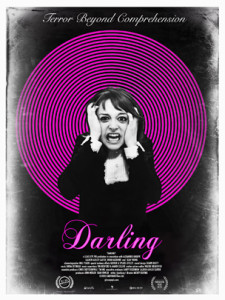When She Calls You Sweetheart: Keating Invokes Femme Fou with Derivative Art-house Thriller
 Riding the thin line between copycatting and homage, indie director Mickey Keating falls somewhere into a derivative funk with his fourth feature, Darling. But check your John Schlesinger-Julie Christie allusions at the door because this slim dish has more of a ‘Women and Madness 101’ agenda. Borrowing heavily from a bounty of 70s era art-house auteurs (and particularly plundering Roman Polanski’s Apartment trilogy), and uniting two stars from the weirdo indie horror Jug Face (one of whom is the unpredictably infamous Sean Young), it would seem the film can’t rise to the expectations established by its own influences. Nicely shot (over a period of twelve days) in velvety black and white, the requisite ambience is there, but the title adds nothing new to a psychological genre necessitating something more narratively dynamic or emotionally complex than what’s offered here. Stretched beyond the limits of its parameters, this would’ve been better served as a music video.
Riding the thin line between copycatting and homage, indie director Mickey Keating falls somewhere into a derivative funk with his fourth feature, Darling. But check your John Schlesinger-Julie Christie allusions at the door because this slim dish has more of a ‘Women and Madness 101’ agenda. Borrowing heavily from a bounty of 70s era art-house auteurs (and particularly plundering Roman Polanski’s Apartment trilogy), and uniting two stars from the weirdo indie horror Jug Face (one of whom is the unpredictably infamous Sean Young), it would seem the film can’t rise to the expectations established by its own influences. Nicely shot (over a period of twelve days) in velvety black and white, the requisite ambience is there, but the title adds nothing new to a psychological genre necessitating something more narratively dynamic or emotionally complex than what’s offered here. Stretched beyond the limits of its parameters, this would’ve been better served as a music video.
A young woman (Lauren Ashley Carter) shows up to take the position as a caretaker of a substantial and vintage complex in New York City. Given instructions and keys by the blasé owner (Sean Young), she learns the last woman who took the job dove off the building’s balcony to her death. Left to her own devices, the young woman almost immediately jets off into mentally unsound wanderings, haunted by eerie visions. But whenever she leaves the apartment, those strange instances tend to follow.
The most obvious point of reference for Darling is Polanski’s 1965 classic, Repulsion, in which Catherine Deneuve famously starred as a frigid, sexually repressed woman who lures a man back to her empty apartment and kills him. Elements of Rosemary’s Baby (1968) and The Tenant (1976) are equally evident as we sift through the endlessly repetitive flash jumps, violent crying jags, and continual breaking of the fourth wall by Lauren Ashley Carter, petulantly gazing at us while engaged in her best Christina Ricci impression.
Sean Young appears briefly, apparently to enhance the film’s credibility (not unlike a similar use of Dee Wallace in Ti West’s The House of the Devil). Performance wise, Carter gives a sound impression of a mentally unstable young woman, but she’s been airlifted from nowhere into a vacuum of assumptions. When many of the most infamous films of this subgenre were in high demand on the American and Euro art-house circuit, with any number of items from Andrzej Zulawski, Tennessee Williams, or Robert Altman (particularly Images or 3 Women) belonging to a similar sorority of unhinged, ‘hysterical’ women, their mental conditions were directly informed by the rampant misogyny, or other suffocating heteronormative elements boxing them into appropriate roles.
While Keating attempts to sew his Darling into a similar period, the lack of characterization for Carter, so referred to thanks to the flippantly designed Madame played by Young, makes everything detailed here seem unnecessary. The ominous room she cannot open, which is obviously a metaphor for the repressed aspects of her own personality, is simply not compelling enough to plaster a whole narrative on top of. Are young, stylish women simply prone to insanity when forced to act as caretaker for inanimate objects or empty spaces?
Produced by Glass Eye Pix’s Larry Fessenden (who shows up briefly as a police officer), it’s clear to see Keating has potential as director, as there are plenty of arrestingly composed frames, while DP Mac Fiskin manages to do some slick work with the repeated interiors. Valerie Krulfeifer’s continuous display of subconscious cuts into nightmarish visions becomes less effective as the running time wears on, and the crew’s inspirations and efforts would have been enhanced by something a bit meatier (we already know exactly what’s going to happen when Brian Morvant’s oblivious male suitor enters the apartment, for instance).
For a similar recent example of the unhinged female psyche also photographed in luscious black and white, Nicolas Pesce’s The Eyes of My Mother does wonders with familiar elements, twisting them into his own uncomfortable odyssey. But there’s nothing uniquely innovative about Darling, even with its fair share of striking visuals and ominous city skylines looming out in montages which would seem to indicate the urban landscape is a jagged maw intent on swallowing its stray denizens.
★★/☆☆☆☆☆


